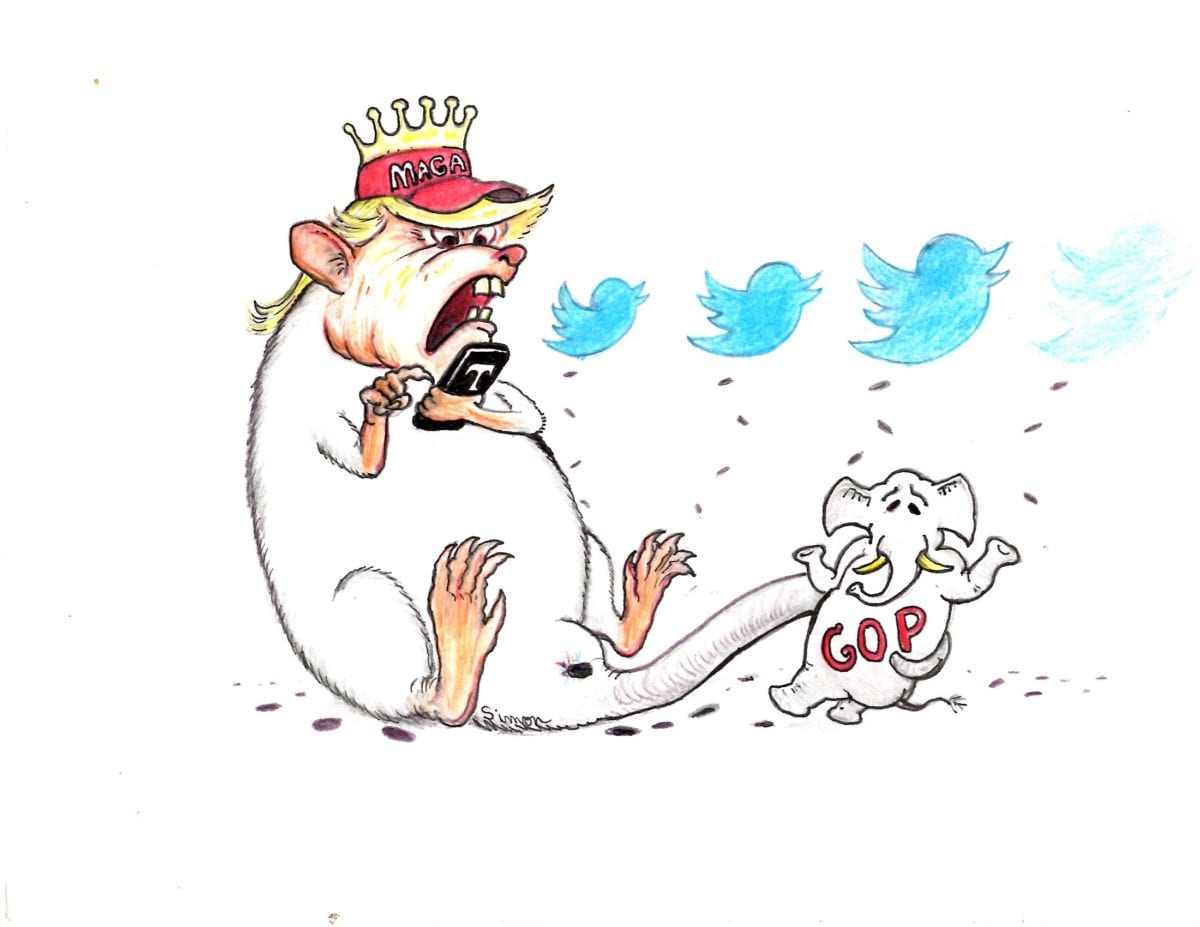
Rat King Trump: Original 8.5 X 11 colored pencil on card stock – New American Journal graphic by Walter Simon: Market Place
The Big Picture –
By Glynn Wilson –
WASHINGTON, D.C. — Nothing will make us healthier or happier in America when we never have to hear about or talk about Donald Trump ever again.
The country and the world would be a much better place if the most corrupt politician in American history would just go away into exile, die or be sentenced to prison in a way that would get him banned from ever holding public office again.
“A man as dangerous as Donald Trump can absolutely never be anywhere near the Oval Office ever again,” Liz Cheney said back when. And she was no liberal democrat. The Justice Department was slow to follow up on her recommendations, and those of the Select House Committee that recommended “multiple” criminal charges against Trump.
Unfortunately, “the people” and “the press” are going to have to deal with Trump for a few more months, before he finally faces a criminal trial and a jury. He faces 91 criminal charges in two federal cases and the election tampering state trial in Georgia. A guilty verdict on any of these charges should prevent him from holding public office ever again, although it is not clear the Justice Department’s specific charges would or were even intended to accomplish this.
But even if the final downfall of the Rat King Trump is nearly at hand, there is a lesson here American voters should learn from the experience of dealing with him so we won’t have to keep going through this anti-democratic dystopia over and over again.
We’ve been covering this for the past few years and months.
Related: The Emerging ‘Come Retribution’ if Trump Sidesteps Jail and Gets Elected President Again
But Donald P. Moynihan, a professor of public policy at Georgetown University and an expert on the administrative state, has a guest op-ed in the New York Times this week making the case why Trump should be disqualified.
“I study government bureaucracies,” Moynihan says. “This is not normally a key political issue. Right now, it is, and everyone should be paying attention.”
Trump Has a Master Plan for Destroying the ‘Deep State’
Moynihan talks about a return to power for Trump in apocalyptic terms.
“Either the deep state destroys America or we destroy the deep state,” he quotes Trump as saying on the campaign trail, where he is still in the lead according to polls in the Republican Primary.
“This is not an empty threat,” Moynihan says. “He has a real and plausible plan to utterly transform American government. It will undermine the quality of that government and it will threaten our democracy.”
A second Trump administration would be very different from the first, he says.
“Mr. Trump’s blueprint for amassing power has been developed by a constellation of conservative organizations that surround him, led by the Heritage Foundation and its Project 2025. This plan would elevate personal fealty to Mr. Trump as the central value in government employment, processes and institutions.”
He says Trump’s plan has three major parts.
The first is to install Trump loyalists into all federal government appointed positions.
Trump believed that “the resistance” to his presidency included his own appointees, Moynihan says.
“Unlike in 2016, he now has a deep bench of loyalists,” he writes. “The Heritage Foundation and dozens of other Trump-aligned organizations are screening candidates to create 20,000 potential MAGA appointees. They will be placed in every agency across government, including the agencies responsible for protecting the environment, regulating workplace safety, collecting taxes, determining immigration policy, maintaining safety net programs, representing American interests overseas and ensuring the impartial rule of law.”
These are not conservatives reluctantly serving Trump out of a sense of patriotic duty, he says, but those “enthusiastic about helping a twice-impeached president who tried to overturn the results of an election.”
“An influx of appointees like this would come at a cost to the rest of us,” he writes. “Political science research that examines the effects of politicization on federal agencies shows that political appointees, especially inexperienced ones, are associated with lower performance in government and less responsiveness to the public and to Congress.”
The second part of the Trump plan is to terrify career civil servants into submission.
“To do so,,” Moynihan says, “he would reimpose an executive order that he signed but never implemented at the end of his first administration. The Schedule F order would allow him to convert many of these officials into political appointees.”
Schedule F would be the most profound change to the civil service system since its creation in 1883, he says.
Presidents can currently fill about 4,000 political appointment positions at the federal level. This already makes the United States an outlier among similar democracies, in terms of the degree of politicization of the government. The authors of Schedule F have suggested it would be used to turn another 50,000 officials — with deep experience of how to run every major federal program we rely on — into appointees.
Other Republican presidential candidates have also pledged to use Schedule F aggressively. Ron DeSantis, for example, promised that as president he would “start slitting throats on Day 1.”
Schedule F would be a catastrophe for government performance. Merit-based government personnel systems perform better than more politicized bureaucracies. Under the first Trump administration, career officials were more likely to quit when sidelined by political appointees.
“Schedule F would also damage democracy,” Moynihan says.
The framers included a requirement, in the Constitution itself, that public officials swear an oath of loyalty to the Constitution, a reminder to public employees that their deepest loyalty is to something greater than whoever occupies the White House or Congress.
“By using Schedule F to demand personal loyalty,” he says, “Mr. Trump would make it harder for them to keep that oath.”
When Trump was president, his administration frequently targeted officials for abuse, denial of promotions or investigations for their perceived disloyalty, Moynihan says.
“In a second administration, he would simply fire them. Trump loyalists reportedly have lists ready of civil servants who will be fired because they were not deemed cooperative enough during his first term.”
The third part of Mr. Trump’s authoritarian blueprint is to create a legal framework that would allow him to use government resources to protect himself, attack his political enemies and force through his policy goals without congressional approval.
Internal government lawyers can block illegal or unconstitutional actions. Reporters uncovered a plan to place Trump loyalists in those key positions.
“This is not about conservatism,” Moynihan says. “Mr. Trump grew disillusioned with conservative Federalist Society lawyers, despite drawing on them to stock his judicial nominations. It is about finding lawyers willing to create a legal rationale for his authoritarian impulses.”
Examples from Trump’s time in office include Mark Paoletta, the former general counsel of the Office of Management and Budget, who approved Trump’s illegal withholding of aid to Ukraine. Or Jeffery Clark, who almost became Trump’s acting attorney general when his superiors refused to advance Trump’s false claims of election fraud.
Clark is now under indictment for a “criminal attempt to communicate false statements and writings” to Georgia state officials.
“But he continues to lay the groundwork for a second Trump term,” Moynihan says. “He has made the case for the president using military forces for domestic law enforcement.”
He has also written a legal analysis arguing that “the U.S. Justice Department is not independent,” and Paoletta has said, “I believe a president doesn’t need to be so hands-off with the D.O.J.”
If government lawyers will not defend norms of Justice Department independence, Moynihan says, “Trump will use the department to shield himself from legal accountability and to pursue his enemies.”
We sometimes think of democracy as merely the act of voting, Moynihan says.
“But the operation of government is also democracy in action, a measure of how well the social contract between the citizen and the state is being kept. When values like transparency, legality, honesty, due process, fealty to the Constitution and competence are threatened in government offices, so too is our democracy. These democratic values would be eviscerated if Mr. Trump returns to power with an army of loyalists applying novel legal theories and imposing a political code of silence on potential holdouts.”
American bureaucracy is often slow and cumbersome, Moynihan says.
“The civil service system in particular is in need of modernization. But it is also suffused with democratic checks that limit the abuse of centralized power. This is why Mr. Trump and his supporters are so precisely targeting the administrative state, taking advantage of an antipathy toward Washington that both parties have long nurtured. If Mr. Trump has a chance to implement his various plans, expect a weaker American government, worse public services and the dismantling of limits on presidential power.”
So the press is doing its job of warning people what might come. The rest will be up to “the people.”
___
If you support truth in reporting with no paywall, and fearless writing with no popup ads or sponsored content, consider making a contribution today with GoFundMe or Patreon or PayPal. We just tell it like it is, no sensational clickbait or pretentious BS.














Terrifying to think …